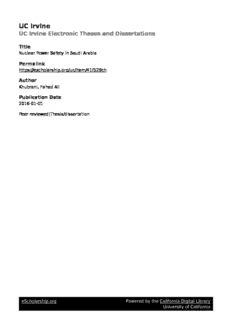
Nuclear Power Safety in Saudi Arabia PDF
Preview Nuclear Power Safety in Saudi Arabia
UC Irvine UC Irvine Electronic Theses and Dissertations Title Nuclear Power Safety in Saudi Arabia Permalink https://escholarship.org/uc/item/41f529ch Author Khubrani, Fahad Ali Publication Date 2016 Peer reviewed|Thesis/dissertation eScholarship.org Powered by the California Digital Library University of California UNIVERSITY OF CALIFORNIA, IRVINE Nuclear Power Plant Safety in Saudi Arabia THESIS submitted in partial satisfaction of the requirements for the degree of MASTER OF SCIENCE in Electrical Engineering by Fahad Ali Khubrani Thesis Committee: Professor Nader Bagherzadeh, Chair Professor Najmedin Meshkati Professor Jean-Luc Gaudiot 2016 © 2016 Fahad Ali Khubrani DEDICATION To my parents and my wife ii TABLE OF CONTENTS Page LIST OF FIGURES iv LIST OF TABLES vii ACKNOWLEDGMENTS viii ABSTRACT OF THE THESIS ix INTRODUCTION 1 CHAPTER 1: Lessons Learned from Severe Nuclear Accidents 5 Three Mile Island 6 Chernobyl 9 Fukushima 12 Onagawa Nuclear Power Station 15 Concluding Remark 17 CHAPTER 2: Nuclear Power Reactor Technology 18 Generation III + Reactors 18 SMRs 27 Concluding Remark 64 CHAPTER 3: Nuclear Safety Systems and Programs 66 Nuclear Safety Perspective 66 I&C Systems 82 Important Nuclear Plant Assets 97 Concluding Remark 100 CHAPTER 4: Safety Culture 103 Safety Culture Model 103 Characteristics of Safety Culture 105 Safety Culture Development 119 Influence of the Regulatory Body on Safety Culture 123 Safety Culture in Pre-Operational Phase 124 Concluding Remark 135 CHAPTER 5: Conclusion 137 REFERENCES 138 iii LIST OF FIGURES Page Figure 1.0 Examples of Events at Nuclear Facilities 4 Figure 1.1 TMI-2 (PWR) Schematic 6 Figure 1.2 Damaged of the Chernobyl-4 Reactor 9 Figure 1.3 Damage to the Fukushima reactor buildings 12 Figure 1.4 Onagawa Nuclear Power Station Location 15 Figure 2.1 AP1000 Passive Safety Systems 18 Figure 2.2 AP1000 Passive Containment Cooling System 19 Figure 2.3 APR 1400 Schematic 21 Figure 2.4 APR 1400 Divisional & Quadrant Layout Arrangement 23 Figure 2.5 EPR Safety Features 24 Figure 2.6 EPR Meltdown Core Compartment 25 Figure 2.7 Reactor System Configuration of CAREM-25 28 Figure 2.8 CAREM-25 Reactor Pressure Vessel 29 Figure 2.9 Reactor System Configuration of ACP-100 32 Figure 2.10 ACP-100 Reactor Building Underground Location 33 Figure 2.11 Layout of AHWR 35 Figure 2.12 Reactor System Configuration of IRIS 39 Figure 2.13 Reactor System Configuration of SMART 42 Figure 2.14 SMART Engineered Safety Systems 45 Figure 2.15 Reactor System Configuration of Westinghouse SMR 47 Figure 2.16 Westinghouse SMR Diverse Decay Heat Removal Methods 50 iv Figure 2.17 NuScale Plant Schematic 52 Figure 2.18 NuScale Emergency Core Cooling System 54 Figure 2.19 Single SC-HTGR Reactor Module 56 Figure 2.20 Reactor Configuration of HTR-PM 60 Figure 2.21 TRISO Fuel Element 61 Figure 2.22 HTR-PM Twin Unit Power Conversion Components 64 Figure 3.1 Defense in Depth Protection Layers 67 Figure 3.2 PRA Model 68 Figure 3.3 IRIDM Process 73 Figure 3.4 Risk-Informed Deliberation 74 Figure 3.5 Seismic Probabilistic Risk Assessment 75 Figure 3.6 Spent Fuel Pool 79 Figure 3.7 Single Dry Cask 81 Figure 3.8 NUHMS Canister and Casks 82 Figure 3.9 HI-STORM UMAX Technology 83 Figure 3.10 Cyber Actors 92 Figure 3.11 Cyber-Attacks Examples 93 Figure 3.12 Computer Security Architecture 94 Figure 3.13 I&C Lifecycle Development Model 97 Figure 3.14 I&C life cycle processes and V&V Activities 98 Figure 3.15 NPP Control Operating System Architecture 100 Figure 4.1 Schein’s Three Level Culture Model 104 Figure 4.2 Nuclear Pre-operational Project Phases 125 v Figure 4.3 Integrated Management Systems 128 Figure 4.4 Safety Culture Model 131 vi LIST OF TABLES Page Table 1.0a Typical Activity Content of a (BWR) Core 2 Table 1.0b INES Event Scale 3 Table 2.1 Characteristics of APR 1400 22 Table 2.2 Characteristics of CREM-25 30 Table 2.3 Characteristics of ACP-100 34 Table 2.4 Characteristics of AHWR 36 Table 2.5 Characteristics of SMRT 44 Table 2.6 Characteristics of Westinghouse SMR 48 Table 2.7 Characteristics of NuScale 54 Table 2.8 Characteristics of SC-HTGR 57 Table 2.9 Characteristics of HTR-PM 62 Table 3.1 Characteristics of NuScale 89 vii ACKNOWLEDGMENTS I would like to express the deepest appreciation to my committee chair, Professor Nader Bagherzadeh, for his great attitude and infinite support. He continually and convincingly conveyed a spirit of adventure with respect to research in the nuclear field. Without his guidance and persistent assistance, this thesis would not have been possible. I would like to thank my committee member, Professor Jean-Luc Gaudiot for his support and acceptance to be a member of my thesis committee. I would like to thank my distinguished committee member, Professor Najmedin Meshkati from the University of Southern California, USC, who has spared no efforts to guide me, share his literature work, and keep me posted on the latest nuclear safety matters. Special thanks to Mr. Ted Quinn, a past ANS president, who shared with me his work in I&C systems and referred me to the MIT Nuclear Plant Safety short program. His motivation for learning about nuclear safety has the lasting effect. viii
Description: